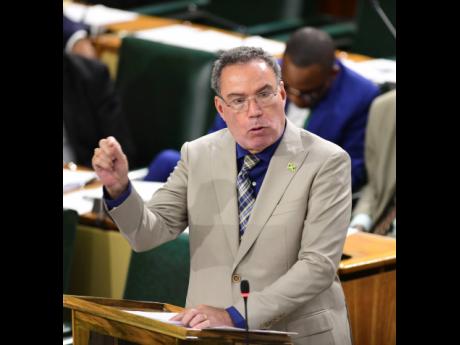Editorial | Light and power theatre
Either Daryl Vaz is engaged in political theatre or the Government has lost faith in the six highly respected and accomplished Jamaicans who were appointed to regulate the island’s public utilities.
Or the minister doesn’t have a clear grasp of his own, or the Cabinet’s powers under the Office of Utilities Regulation (OUR) Act and/or the licence giving Jamaica Public Service Company (JPS) monopoly right to transmit and distribute electricity on the island.
Which may explain why Mr Vaz is threatening to instigate a commission of inquiry into the JPS’s post-hurricane operations, and, apparently, how the OUR has functioned.
Since Hurricane Beryl sideswiped Jamaica seven weeks ago, Mr Vaz, who has ministerial responsibility for telecommunications and light and power, has seemingly been full of kinetic energy, attempting to spur the island’s utilities back to full operation. He talks about it incessantly.
Indeed, for a time, Beryl left over 400,000 Jamaicans, or over 60 per cent of JPS’s customers, without power. Hundreds of electricity poles and many miles of transmission and distribution cables were damaged or destroyed by the Category 4 storm.
Most people are now back onto the grid. However, small, but significant pockets of consumers, especially in the southwestern parish of St Elizabeth, which was hardest hit by the hurricane, remain without power. People in these communities regularly rail against the light and power company, which failed to meet some of its early deadlines for electricity restoration.
JPS did itself no favours with its initial poor communication on the crisis and overstating its capacity to rapidly return power. Then it announced its intention to charge its customers via estimated bills, despite possessing the technology that, on its face, should have allowed it to provide real-time information about their power use up to the time the power lines were knocked out.
All of this has been exacerbated by complaints by several consumers of higher post-hurricane bills, which the company has blamed on increased prices for imported fuel and a declining exchange rate for the Jamaican dollar against the US currency with which it pays for imports.
It is against this backdrop that Minister Vaz has maintained an almost daily harangue of the light and power company, in which the Government has 19 per cent stake, for its missed restoration deadlines and its ostensible insensitivity to consumers.
CHAMPION OF CONSUMERS
The visage of Mr Vaz is of the champion of consumers, which is likely to have deflected what might otherwise have been public anger against the Government.
The minister’s latest volley on this front was a declaration this week that he is taking advice on holding a commission of inquiry into the JPS’s recovery effort, and apparently, into how the OUR has conducted itself as a regulatory body. He appears to also want more ministerial regulatory authority during periods of natural disasters.
This week, Mr Vaz told the radio station, Nationwide News Network: “...I am considering to recommend and to hold consultations with stakeholder groups for a commission of inquiry into the issues that consumers are facing and what we can do to make sure in the last few years of the (JPS’s operating) licence that we can find a way that we can have autonomy in relation to the operation of the OUR and the JPS.”
With respect to increased ministerial powers over utilities in certain circumstances, he said: “Once there is a disaster there has to be a transition when the Government takes control of the policy directives that govern recovery, which includes electricity.”
There is, of course, need for greater clarity in Mr Vaz’s statement, although his intentions are apparent. Which, it seems, is to pile regulator upon regulator, with direct ministerial intervention.
A SIDE SHOW
The fact is, JPS and similar utilities are regulated by the OUR, whose functions include, at Section 4 (1) of the Office of Utilities Regulation Act, to:
(d) “...advise the responsible minister on such matters relating to the prescribed utility service as it thinks fit, or as may be required by the minister; and
(e) “...carry out, on its own initiative or at the request of any person, such investigations in relation to the provision of the prescribed services as well as to enable it to determine whether the interests of consumers are adequately protected.”
The OUR operates under the general policy direction of the Cabinet.
But the office is comprised of the director-general, Ansord Hewitt, who has superintendence over its day-to-day operations. The other members are its chairman, Professor Alvin Wint; David DaCosta, Damien King, Yasmin Chong; Simon Roberts and Dan Kelly.
It would be useful for Mr Vaz to say if he is dissatisfied with how that group has overseen the OUR regulatory efforts, in which event, he should recommend their firing. That doesn’t require a commission of inquiry.
Further, the minister isn’t entirely without power to intervene and takeover the operations of JPS, or parts thereof, if he believes it has failed to operate within the terms of its licence, except for force majeure.
Section 31 of the licence says: “If the Licensee shall have ceased to operate all, or any substantial part of the system and/or any generation facility for a period of forty-eight (48) consecutive hours (the initial period) without the prior written consent of the Minister (a step-in event), then the Minister or his designee shall be entitled to enter any and/or all of the site(s) and operate the system and/or any generation facility…”
Critically, too, Parliament is now reviewing the Electricity Act, which should inform any new licence to the JPS in two years’ time. A commission of inquiry, in the circumstances, would seem like a side show.

